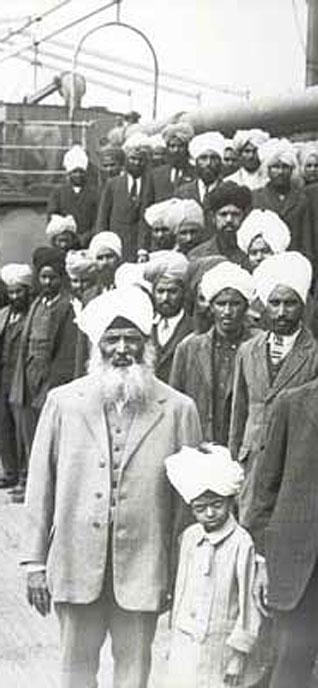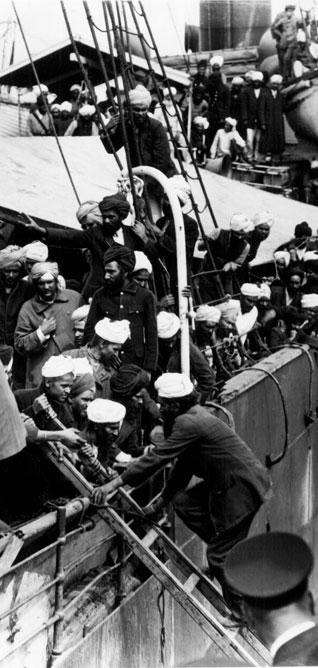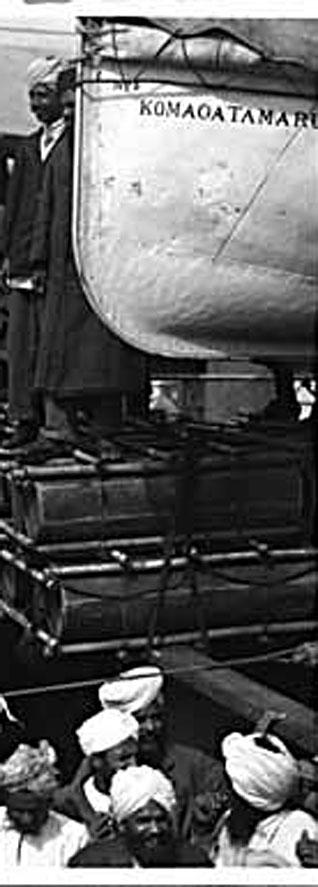Our Heroes
The Komagata Maru Saga
by TOM HAWTHORN
The story passed from grandfather to father to son, from grandmother to mother to daughter. It was handed down by a generation for which it was a living memory, to one for which it was a cautionary tale, to a third generation, born in this land, for which it was an injustice in need of an apology.
In the early 1960s, when he was a boy of six or seven, Munmohan Singh Sihota remembers visiting the gurdwara outside Duncan (British Columbia, Canada) on a day when his father, a mill worker, told him an incredible tale.
A boatload of immigrants from Punjab, the father's birthplace, had arrived in Vancouver harbour on May 23, 1914, after an arduous voyage across the Pacific. They were refused permission to land. As days passed into weeks, conditions on board deteriorated. Water was in short supply, the food barely edible.
The authorities, fearing an end to Canada as a "white man's country", ordered the ship to return to India. The passengers prevented the Japanese crew from lifting anchor. After eight weeks, a raiding party of 200 policemen and special constables tried to board the steamer, only to be beaten back by the Sikhs.
The next day, the navy cruiser Rainbow escorted the steamer out of the harbour.
The boy would never forget the singsong name of the ship, Komagata Maru, nor the travails of its passengers: 340 Sikhs, 24 Muslims, 12 Hindus, all British subjects. The mere mention of the steamer brought to his mind a photograph of the passengers with the beards and turbans of observant Sikhs.
The boy grew up, earned a law degree, won a council seat in Esquimalt. In 1986, "Moe" Singh Sihota became the first Sikh-Canadian (and Indian/South-Asian) to be elected to a legislature in Canada, a designation that did not mean much to him at the time.
He raised the issue of the Komagata Maru in the B.C. Legislature. "I remember the political brouhaha", he said.
In 1989, on the 75th anniversary of the vessel's arrival in B.C. waters, a member of the governing Social Credit Party (Socred) noted the date and described it as a day of "provincial disgrace".
Mr. Sihota then asked the Socred tourism minister what had been prepared to commemorate the incident.
"The simple answer", replied Bill Reid, "is nothing".
Later, the minister would insist any commemoration would be the responsibility of private groups and not the government.
Later still, during a heated exchange about another matter, Mr. Reid taunted Mr. Sihota by shouting out, "Komagata Maru! Komagata Maru!"
Mr. Sihota felt a flash of anger, a memory that lingers.
On Friday, the 94th anniversary of the vessel's arrival, the atmosphere inside the legislature was entirely different. The public gallery included descendants of the passengers forcibly expelled from Canada.
Government House Leader Michael de Jong introduced a motion apologizing for the events.
"Happily, times have changed", he said. "Unhappily, the ability to present this apology directly to the victims of the events of 1914 no longer exists".
"They encountered racism and hatred", Attorney-General Wally Oppal said. "As they remained on ship, they were deprived of many of the necessities of life. Elected officials, members of the media and the public collectively fanned the flames of hatred. The cry of the day was that Canada was a white man's country. Today this treatment would be unimaginable".
As unimaginable as it would have been in 1914 to have a legislature in which members carry such venerable family names as Oppal, Bains, Brar, Lali, Hayer, Chouhan.
If the story had been passed from generation to generation in some communities, in other households it was ignored.
Liberal MLA Lorne Mayencourt acknowledged he had not known of what he called "this black mark on our history" until just a few years ago.
Why an apology?
"What it offers is healing", Harry Singh Lali of the NDP (New Democratic Party) told the House. "It offers healing, even though it's 94 years late".
The motion passed unanimously. The news made The Times of India and was carried by the Press Trust of India. The federal government is working on an apology, as well.
Some commentators decry what they call an apology industry that seeks financial compensation for misdeeds of long ago.
For Mr. Sihota, though, the simple act of apology carries significance.
"It has resonance and meaning. It's another reflection that we are what we say we are. We are a society that encourages the sharing of cultures and respects the differences of religions and languages.
"It fortifies our embrace of multiculturalism".
Mr. Sihota left electoral politics seven years ago, ending a controversial career that saw him twice resign and be reinstated to cabinet after conflict-of-interest investigations. Some saw him as brash, others as bold. His opponents called him a pit bull.
These days, he appears on a CBC political panel, works as a consultant, owns a share of an Edmonton golf course and is currently supervising the completion of a Sheraton hotel in Langford set to open in June.
Whatever else he is and whatever else he does, he remains the son of a man from Barapind in Punjab, who passed on to him an unforgettable story of tribulation. Moe Singh Sihota was born in 1955, just eight years after the right to vote had been restored to Sikh-Canadians and other Indians/South-Asians. (It had been taken away in 1907.)
Raised in the Cowichan Valley, he went to university and, like so many of his generation, joined one of the professions - law, education, civil service - from which his parents had been barred.
He remembers on election night in 1986, as he prepared to speak to a raucous celebration at the Esquimalt Recreation Centre, looking at the faces of the people standing against the walls.
"They were all old-timers. They hadn't been involved in my campaign, but I knew them from all different walks of life as I was growing up. They were there to see something they didn't think was ever going to happen" -- a Sikh-Canadian, one of their own, in the legislature.
More than twenty years later, after Mr. Sihota raised the question of an apology, the story of the Komagata Maru has a new ending.
[Courtesy: The Globe & Mail]
June 4, 2008
Conversation about this article
1: Satvir Kaur (Boston, U.S.A.), June 05, 2008, 3:46 PM.
Does anyone remember the movie that was going to be made on this topic? If anyone has info let me know please. [Editor: Famed Canadian filmmaker Ali Kazimi has recently produced an extraordinarily good documentary on the subject, called "Continuous Journey". Deepa Mehta - of "Water" fame - is currently working on a fictionalized feature film.]
2: Sukhindarpal Singh (Penang, Malaysia), June 08, 2008, 7:46 AM.
In the Sikh congregation of Penang, a port city on the West coast of then British Malaya, which was one of the ports of call of the Komagata Maru on its journey back, I am told that when the local authorities refused permission for the ship to be re-provisioned, prepared Guru-ka-Langar and walked a distance of two km bearing the Guru's gift so that their Sikh brethren would not want for food. I was told this by some very devoted Sikhs who have since passed on. The Gurdwara Sahib Penang, which was built in 1903 and is still standing, was the scene of this seva.
3: Mahinder Kaur Doman (Victoria, British Columbia, Canada), June 23, 2008, 2:13 AM.
Last year, I met a film producer on Vancouver Island who was going to produce a film on the Komagata Maru. In pioneer Sikh and Indian immigration history, this is an interntional incident which has never been fully and carefuly examined. Nor has the Sikh and Indian immigration experience and history been written by the first generation descendants; rather by people who came much later and produce books with so much misinformation. I am one of those descendents - and expect to publish a book this Fall about pioneer immigrants giving voices to the descendants whose parents fought peril, strife, acts of discrimination and violence, and who were determined to make this country a better place than how they found it. Also to give a loud voice to those forgotten pioneers, and to let their spirit know WE HEARD YOUR STORIES, AND WILL PROMOTE YOUR STORIES forever ... This ship is only a tiny part of pioneer immigrant Indian (mostly Sikhs) history who never had difficulty to live together as brethern regardless of their faith, caste, etc.






